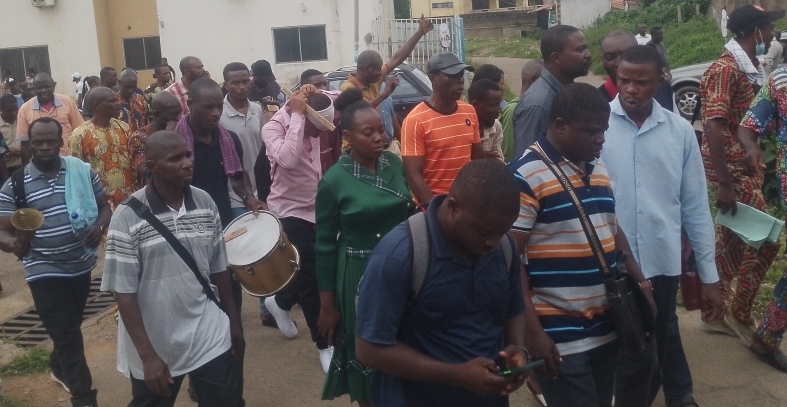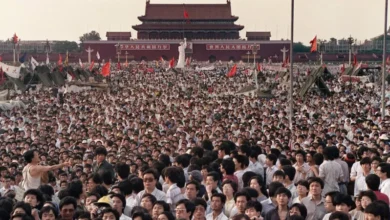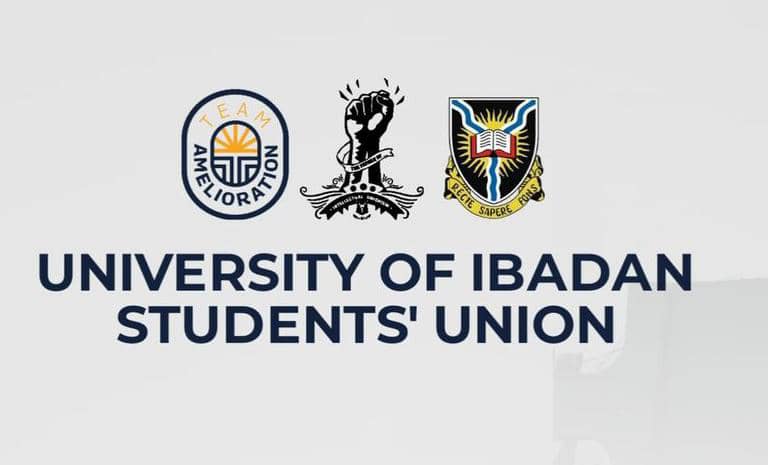Strikes And the Art of Breadcrumbing

This is Nigeria, where your resumption into a federal school after gaining admission can be extended by a calendar backlog due to academic strikes. This is Nigeria where the number of years you are expected to spend in school is a variable ‘x’ that is proportional to the number of academic strikes and the length of each one in your undergraduate years. If you eventually get out into the job market and decide to work for the federal government; this is Nigeria where you will be owed for months until Nigeria Labour Congress strikes with strike actions. This is Nigeria where the autonomy granted to federal universities came with the promise of no more academic strike actions. Of course, the recent news of ASUU’s cry begs to differ. This is Nigeria where the premier progressives and some other politically indifferent figures take solace in the façade that if there’s one good thing about this teeth-gnashing, heart-wrenching administration, it is that the sitting president will never allow strikes to happen. Again, a half-tenure review of this presidency begs to differ. This is Nigeria where Medicine and Surgery – one of the widely acclaimed courses that offers job security – has its elders threatening to go on strike because of unpaid salaries and ignored demands. This is the University of Ibadan where the brightest minds in the country are projected to spend 8+ years in medical school while also watching their senior colleagues go on strikes because of unpaid salaries. The bar is now really low that strikes are no more objects of concerns but breaks from unending burdensome work hours. From another POV, they are also the reminders that certain set of people in the country’s workforce have not been paid for months and no one is speaking up.
After a 14-day ultimatum that elapsed on the 13th of October, ASUU began a two-week warning strike. For the University students, the strike definitely struck a core memory from 2022 when we were asked to sit at home for eight months, just as we were recovering from a global shutdown due to COVID from 2020. The playbook seemed all too familiar, and many questioned if history wasn’t repeating itself, considering that circumstances don’t seem to have changed much. Well, Nigeria has a new president, one whom many swore wouldn’t watch a strike occur – or linger if it did – perhaps because he pledged so at the outset of his administration. And for some reason, they believed he didn’t fit the regular profile of politicians who default on campaign promises. Earlier in July this year, the Minister of Education affirmed the president’s directive to avert any strike action by bodies in Nigerian tertiary institutions, including ASUU. One would think that automatically implies that the issues that necessitated the 2022 strike were already being addressed. But one would be wrong, because as ASUU’s press release would show, this has not been the case. The tears of the hands that mould us have not been wiped, they have only been dabbed with occasional backlog payments.
When Tacitus posited the maxim, “In all things, there is a law of cycles,” he understood that repetition as a natural law in history, politics, and life is based on the self-evident truth that similar conditions yield similar results. In his wisdom, we must turn to our brothers who believed this wouldn’t happen and ask them what conditions have changed since 2022 to preclude the possibility of the strike. But circumstances have indeed changed since then, haven’t they? After all, there’s the new NELFUND Student Loan (which we have argued is anti-student), a seven-year moratorium on the establishment of new federal tertiary institutions because the Federal Government finally realised that more doesn’t always mean better when you’re not taking care of what you have, approval of admission entry reforms to increase annual tertiary admissions to from 700,000 to 1 million, raised retirement age to 70 with enacted pension scheme for academics, … But based on what ASUU’s release indicated, none of these cures their decade-long problems.
Ripple Effects of Breadcrumbing
The 2009 agreement that you have probably got tired of hearing — yes, the same one that has witnessed seven strikes, four presidents, and nine ministers of education without satisfactory progress — called for substantial injections into the nation’s education system, an obvious requirement if there is going to be any significant development in the sector.
In 2022, the FG proposed amendments to university laws for greater autonomy. However, academics lament continued interference in Councils and VC appointments, with the IPPIS payroll system remaining imposed in place of ASUU-proposed UTAS. With these issues still outstanding, one wonders why the government claims to have addressed all requests, including welfare and governance. In the words of the Minister of Education, “We have done everything they asked.” Everything? We could spend all day marveling thus at the wonder that is the Nigerian Government, but we know it would do us little good.
In October 2023, President Tinubu approved a partial waiver of the “No Work, No Pay” policy, releasing four out of the eight months of withheld salaries for ASUU members, although it required a Document of Understanding that no further waivers would be granted for future strikes. ASUU has however criticized this as insufficient, with demands for the remaining months persisting till now. One can therefore imagine the irony of the FG’s recent threat to invoke this same policy should academics choose to embark on another strike to press home their demands.
By 2025, the government released only N50 billion for revitalization and allowances, which ASUU dismissed as inadequate compared to the originally approved N150 billion. This fund was also criticized for being spread across all tertiary institutions rather than focused on universities. Expectedly, ASUU continues to warn that inadequate funding will be the bane of Nigeria’s education system, with perpetuated challenges that will continue to have ripple effects, including brain drain, stunted research (no dedicated research fund), dilapidated infrastructure, and lowest remuneration in Africa.
It’s a sad cascade through these years but the federal government under different administrations since the 2000s has mastered the art of breadcrumbing ASUU and affiliate organizations, leaving the lives of hundreds of thousands of students to suffer the consequences through delayed and lengthened undergraduate years. The two-week warning strike ended on the 22nd of October on the basis of reciprocating the efforts of well-meaning Nigerians being students, parents, and the NLC after a long meeting with the federal government in the early hours of the day. Breadcrumbing at play once again. It’s only a matter of months before ASUU realized that they have been played and they need to go on another strike action to be heard. Right now, we are left with the effects of the current strike on the educational system. Ranging from postponed exams at universities such as UNN, to delayed resumption of a new session at universities like LAUTECH, OAU, University of Lagos, to lengthened semesters at other universities.
In the University of Ibadan, the two-week strike calls for calendar adjustment as students edge on to the end of the session in preparation for exams. Academically, that ‘break’, as people call it for comic relief, drops the morale of that student whose sign-out date is in view. Worse is the case of the medical students who have longer time to spend in school compared to their counterparts in other disciplines.
Stakes And Chaos In Ibadan Medical School
What the medical – read as clinical – students in Ibadan have learnt over the past few years is that when ASUU strikes, it doesn’t really affect them as clinical postings still continue, only that certain activities like End Of Posting Tests (EOPTs) will be delayed until the strike is called off. The game is now different since Prof. Adefemi Afolabi from the department of Surgery, Faculty of Clinical Sciences, emerged the new ASUU-UI chapter chairman. There were speculations of the strike affecting medical students because the college might want to stand in solidarity and stop academic activities.
However, some had school and some halted school. The ten days that looked like ‘break’ in UI was chaos in COMUI as certain departments didn’t engage the students rotating through their units as an action in solidarity with ASUU while activities continued in some other departments as though the strike was non-existent. Students woke up each morning with uncertainty on what to do for the day as there were no clear communication on the college’s stance on the strike. Students just inferred the college didn’t join and that came from the fact that the faculty officers didn’t agree to calendar readjustments which would be the ripple effect of joining the strike. As comical as ASUU strike has now become, it’s just one of the many strikes plaguing the country as of the time of writing. The National Association of Residents Doctors’ strike is another.
On Sunday, the 26th of October, 2025, after a 5 hour NEC meeting, the National Association of Resident Doctors (NARD) declared a “total, comprehensive and indefinite” strike action to start on the 31st of October, 2025. The ultimatum expired with 19 unresolved welfare and administrative issues affecting resident doctors and medical officers across the country.
These demands aren’t new, they are recycled grievances from previous strikes, essential demands necessary for the improved well being of doctors all around the country. This is the Nigeria where the doctors who save lives are owed months of salaries while being expected to work 24 hour shifts with inadequate equipment and no hazard allowances.
The same Nigeria where resident doctors, who are the backbone of her healthcare system are forced time and time again to choose between abandoning their patients and abandoning their dignity. This irony is not lost on medical (clinical) students rotating through these same hospitals watching their future colleagues protest unpaid wages while they themselves rack up debts in NELFUND loans preparing for a profession that apparently does not value it’s practitioners to pay them well or on time.
This will not be the first time NARD has gone on strike over poor welfare. There have been similar strikes in 2023 and 2024. It’s basically the same playbook being used on ASUU and other labour organizations across Nigeria—promise meetings, set up committees, release memos and then… nothing substantial changes. The doctors go back to work, and the cycle continues until the next ultimatum. Breadcrumbing at it’s finest. And as if the looming NARD strike wasn’t enough, another healthcare crisis unfolds in Oyo state.
On the 29th of July, about 60 resident doctors in LAUTECH teaching hospital embarked on an indefinite strike. This happened after the hospital management and the state government failed to meet their demands which primarily included the implementation of minimum wage for LAUTECH Teaching Hospital staff, despite the implementation for the other healthcare workers in the state.
To make matters worse, following a 15 day ultimatum, nurses and midwives also commenced their own indefinite strike in September due to this same minimum wage issue. Both strikes were eventually suspended in early October after Gov. Seyi Makinde’s intervention and promise to address their demands.
All these strikes show a recurring pattern in Nigerian institutions. Industrial actions often end after government intervention, yet the root causes like wage disparities, non-implementation of previous agreements and insufficient funding remain unaddressed. For Nigerian workers, this cycle creates uncertainties about salaries and working condition (mostly poor working conditions). For students, this cycle translates into disrupted calendars, delayed graduations and declining confidence in the stability of public education. It’s sick that after all these, no meaningful change is found. The government’s continued reliance on reactive measures rather than long-term reforms shows large weakness in labour and institutional management. Without structural solutions, similar strikes and widespread consequences will continue to occur. And the wheel will almost forever keep turning. Different faces, same story. Breadcrumbing, after all, is an art perfected over decades. Why change what works?




